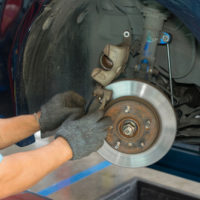Auto Manufacturers Agree to Make Automatic Emergency Brake Systems Standard in New Vehicles

In what is seen as a major step forward for the safety of drivers and passengers, 20 major car manufacturers representing nearly all of the American vehicle market have agreed to make Automatic Emergency Braking (AEB) systems standard on new vehicles. The manufacturers announced that the feature should come installed on nearly all models by September of 2022. The National Highway Traffic Safety Administration (NHTSA) and Insurance Institute for Highway Safety (IIHS) have lauded the automakers’ commitment as an important improvement in roadway safety.
AEB systems are an automated feature designed to augment the braking power of the driver. The systems use cameras, radar, and lasers to scan the roadway in front of the car for slowing, pedestrians, or other objects, and will warn the driver when a crash appears imminent. Depending on the system, the car will either increase the amount of brake pressure where the driver is applying an insufficient amount to avoid a crash, or will do all the braking if the driver is doing none.
AEB systems were developed roughly 20 years ago, beginning to appear as an available feature in 2000 in a model of Mercedes-Benz. Since that time, the feature has become more common, though largely as an option rather than a standard feature. A related feature is that of the Front-Crash Warning (FCW) system, which conducts a similar scan of the roadway, but has no independent power to brake the car.
In studies conducted by the IIHS, AEB and FCW systems have been found to make a substantial difference in crash reduction. One IIHS study looked at the involvement in police-reported crashes of cars without any crash warning or braking systems, cars with only FCW systems, and cars with AEB systems. The study found a 23% reduction in crash involvement among cars with an FCW system, and a 39% reduction among cars with an AEB system. Injury crashes went down by 43% for drivers with an AEB system. The IIHS concluded that, had every car on the road had an AEB system in 2013, the number of crashes would have decreased by 700,000, with injury crashes going down by 300,000. Experts caution that the systems are not infallible and can sometimes fail, requiring drivers to still exercise caution, even when driving an AEB system-equipped vehicle. Drivers are ultimately liable for any crashes in which their cars are involved, even when using automated features such as AEB systems.
If you are facing mounting medical bills and a drop in income from lost work after a car accident in Alabama, contact the determined and knowledgeable Mobile personal injury attorney J. Allan Brown for a consultation on your claims, at 251-473-6691.




